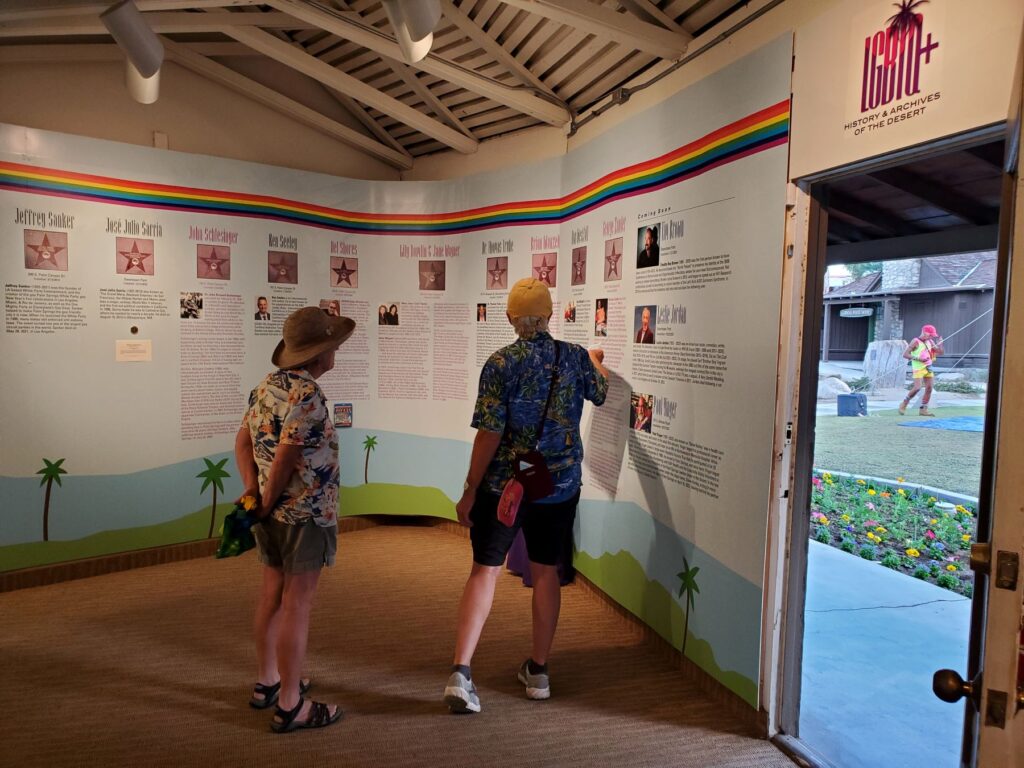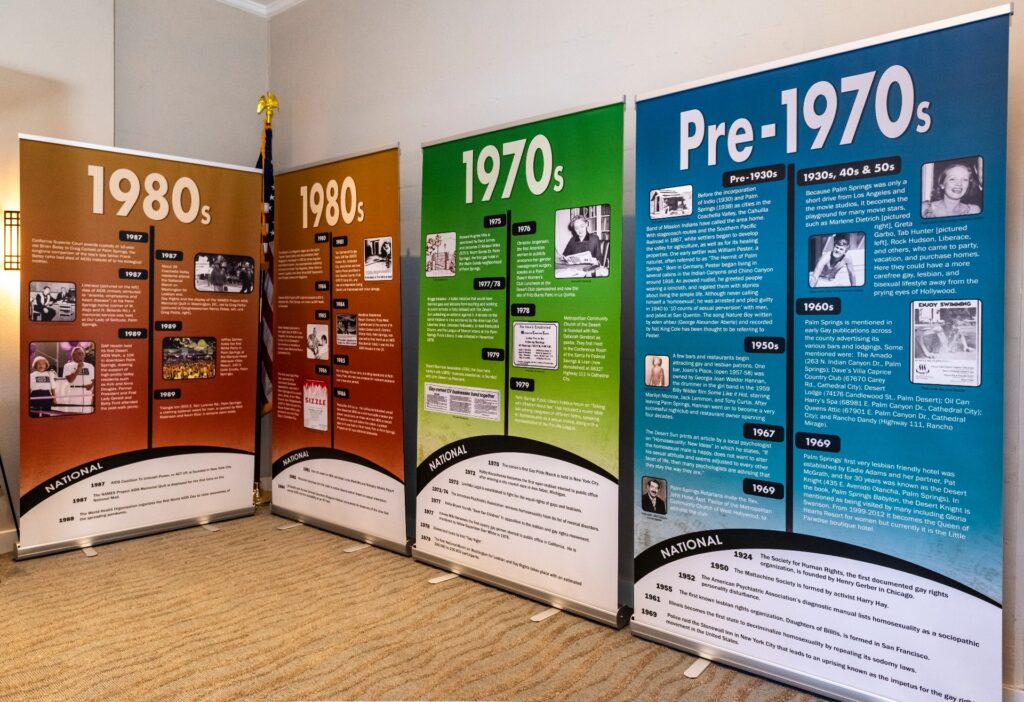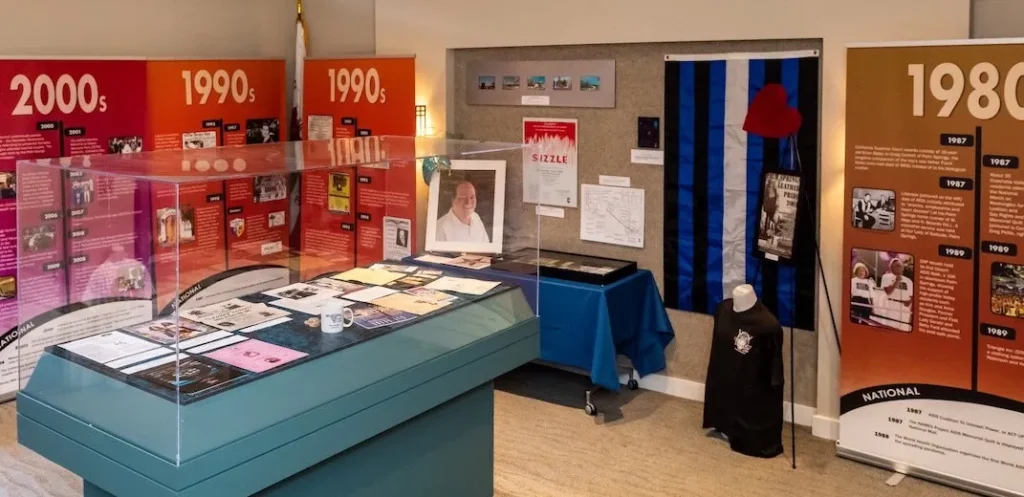All You Need To Know About the LGBTQ+ History & Archives of the Desert

LGBTQ+ History & Archives of the Desert
Preserving hidden stories under the desert sky. That’s what the LGBTQ+ History & Archives of the Desert is about. For the desert isn’t just a landscape of sand and stone, it’s a keeper of stories—tales of resilience, resistance, love, and community. Stories that have often gone untold. The LGBTQ+ History & Archives of the Desert invites you to explore how a remote, sun-baked region can become a powerful archive of queer life. Through photographs, letters, oral histories, posters, and everyday objects, this archive preserves the voices of those who shaped LGBTQ+ communities. Not only in Palm Springs but other desert towns, camps, and crossroads where people sought belonging against the odds.
What this archive is all about
It is a mission to collect, preserve, and share LGBTQ+ histories connected to desert regions. From early community organizers to contemporary advocates. A living repository that honors diverse identities and experiences. For example this includes LGBTQ+ people of color, immigrants, youth, elders, and allies. Indeed a bridge between past and present. As a result, the archive can give researchers, students, artists, and the curious public access to stories. Ones that illuminate how desert life intersected with gender, sexuality, and social change.
What kinds of materials you’ll find
Materials include oral histories and personal testimonies that reveal everyday life, challenges, and triumphs in desert communities, including Palm Springs regarded very much a hub for the IGLBTQ+ community. The collection includes photographs, scrapbooks, posters, zines, and flyers from clubs, support groups, rallies, and mutual aid efforts. Letters, diaries, and organizational records from local advocacy groups, shelters, and community centers. Even mews clippings, event programs, and artifacts that capture moments of pride, protest, and cultural expression. And in the modern age, digital archives and catalogued collections that make these stories accessible beyond the desert’s horizon.

Why the desert is a place where these histories matter
Geographic isolation and climate shaped how LGBTQ+ communities formed, supported one another, and navigated visibility in public life. Migration and labor patterns (seasonal work, service industries, roadside economies) created unique networks of kinship and resilience. The archive highlights intersectionality—how race, age, disability, language, gender expression, and immigration status all influenced experiences of queerness in desert spaces. Preserving these stories helps current and future generations understand not just the struggles, but the creativity, humor, and joy that flourished in unlikely places.
How the archive works (and how it’s kept safe
Community-led collecting: researchers and volunteers work with local residents to identify stories worth preserving.
- Ethical stewardship: consent, accuracy, and respect guide every interview, donation, and description.
- Preservation in practice: climate-conscious storage, digital backups, and careful handling of fragile materials to withstand desert heat and dust.
- Access for all: a combination of in-person viewing, guided tours, and a searchable online catalog that opens doors to distant readers and researchers.
How to access and engage
- Visit the archive in person by appointment to view primary-source materials, hear audio recordings, and meet with archivists who can guide you through the collections.
- Explore digital collections online to view photographs, transcripts, and documents from anywhere.
- Join curated exhibits and programs, including oral history listening sessions, community conversations, and artist talks that bring the archives to life.
- Stay informed through newsletters, social media updates, and occasional pop-up events in nearby towns and cultural centers.

Ways to contribute and support
- Donate archival materials: photographs, letters, posters, club ephemera, and anything that tells an LGBTQ+ desert story. We’ll help assess provenance, care, and context.
- Volunteer your time: assist with transcription, cataloging, oral history interviews, archival processing, and cataloging digitized items.
- Support digitization projects: fund high-quality scans, metadata creation, and user-friendly online interfaces so people worldwide can access these stories.
- Nominate stories and community voices: help identify individuals or groups whose experiences deserve preservation and public sharing.
- Attend and share: bring friends to exhibits, invite schools and community groups, and help broaden the archive’s reach.
Imagine a faded poster from a desert town’s early pride event, tucked into a scrapbook alongside a scanned interview with a longtime volunteer who ran a clandestine support circle out of a motel lobby. The audio reveals the hush of a crowded room, the tremor of fear, and the rush of collective courage when a local sheriff’s deputy quietly handed a note of protection to the organizers. This single thread—poster, interview, and government document—connects decades of lived experience. Showing how ordinary people built safety nets that still support new generations today.
A few ideas for creators, educators, and storytellers
- Host a community night at the archive featuring oral history readings, music, and open dialogue about desert queer histories.
- Develop classroom packets that pair primary-source materials with guided activities about archival research and the ethics of storytelling.
- Collaborate with local artists to reinterpret archival images into new works—photography, mural projects, or digital storytelling that invites contemporary voices into the conversation.
- Create a listening booth or podcast series that foregrounds firsthand audio from residents who lived through key moments in desert LGBTQ+ history.
Final thoughts
LGBTQ+ History & Archives of the Desert is more than a repository. It’s a celebration of memory, community, and continuity. By preserving and sharing these stories, we honor those who came before us, illuminate present possibilities, and empower future generations to write their own chapters in the desert’s long and complex history. If you’re drawn to this mission, consider lending your voice, your memories, or your support to help keep these histories vibrant and accessible for everyone. Learn more and explore the digital collections by visiting our website or contacting the archive for visits and partnerships. You could also subscribe to our newsletter to receive updates on new acquisitions, exhibits, and upcoming events. In addition you could Follow us on social media to engage with ongoing conversations about desert LGBTQ+ history and archival practice. Check out the LGBTQ+ History Organization.
Explore the LGBTQ+ History & Archives of the Desert with a Holiday Houseboy
What better to explore the LGBTQ+ History & Archives of the Desert than with a Holiday Houseboy, your local gay friendly tour guide. Simply click on the GUIDE INFO below to see who is available in Palm Springs.

Tags: Gay Palm Springs, LBGTQ+ Desert, LGBTQ Desert, LGBTQ+ Archives, LGBTQ+ History, LGBTQ+ Hostry and Archives of the Desert

